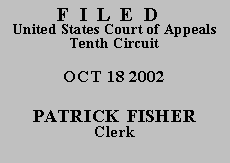

| JAMES JOEL SUMPTER; DENISE
SUMPTER,
v.
DOWELL COMPANY; DOWELL, a
division of Schlumberger Technology
Corporation; DOWELL
CEMENTING |
|
Before KELLY, McKAY, and MURPHY, Circuit Judges.
The plaintiffs, Joel and Denise Sumpter, brought an action in tort to recover for Joel Sumpter's injury after a cement well head fell on his ankle while he was working in the oil fields of Saudi Arabia. Because they did not know who designed, manufactured, or owned the cement well head, the Sumpters' complaint named a number of defendants. They succeeded in serving only one defendant: Dowell Texas. When Dowell Texas moved for summary judgment on the ground that it had no connection to the well head, the Sumpters moved to amend their complaint to add a new party, Dowell Saudi Arabia, as a defendant. The district court denied the Sumpters' motion to amend and granted Dowell Texas' motion for summary judgment. The Sumpters appeal the district court's denial of their motion to amend. This court exercises jurisdiction pursuant to 28 U.S.C. § 1291 and affirms.
The sole issue on appeal is whether the district erred in denying the Sumpters' motion to amend their complaint. This court reviews a district court's denial of a motion to amend under an abuse of discretion standard. Varley v. Tampax, Inc., 855 F.2d 696, 700 (10th Cir. 1988). A district court decision constitutes an abuse of discretion only if it is "arbitrary, capricious, whimsical, or manifestly unreasonable." Caletti v. Cudd Pressure Control, 165 F.3d 767, 777 (10th Cir. 1999) (quotation omitted).
In denying the Sumpters' motion to amend, the district court concluded that with less than two weeks before the scheduled trial date the interests of justice would not be served by granting the Sumpters leave to amend their complaint. It further noted that
it would not be in the interests of justice to grant Plaintiffs leave to amend their complaint. The record reveals that Plaintiffs were indeed advised from the outset of this litigation that they had not named the proper party. Despite such warnings, Plaintiffs obviously did not conduct the necessary discovery to identify the proper parties to this action. Granting leave to amend would only reward Plaintiffs for their dilatory conduct and missed opportunities to correct their pleading deficiencies.
Upon review of the parties' briefs and contentions on appeal, the district court order, and the entire record, it is clear that the district court did not abuse its discretion. The Sumpters had nearly a year from the date of Dowell Texas' amended answer to conduct further discovery as to who was the proper defendant. The district court quite correctly noted that the Sumpters' failure to undertake reasonable steps to discover the proper defendant weighs heavily against granting their motion to amend. This is especially true when the motion to amend was filed just two weeks before the scheduled start of trial. This court concludes the district court did not abuse its discretion in denying the Sumpters' motion to
amend their complaint and affirms for substantially the same reasons provided by the district court.
ENTERED FOR THE COURT
Michael R. Murphy
Circuit Judge
*. This order and judgment is not binding precedent, except under the doctrines of law of the case, res judicata and collateral estoppel. The court generally disfavors the citation of orders and judgments; nevertheless, an order and judgment may be cited under the terms and conditions of 10th Cir. R. 36.3.